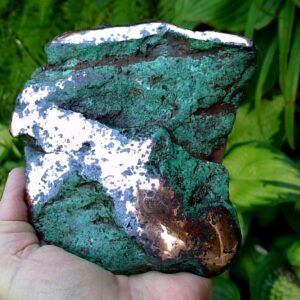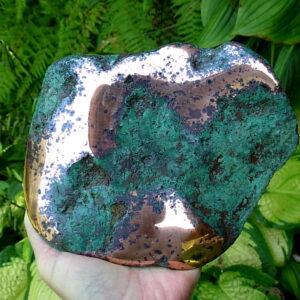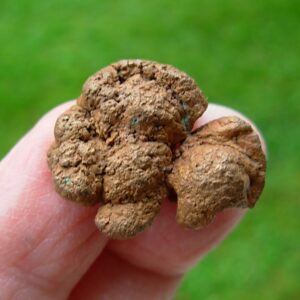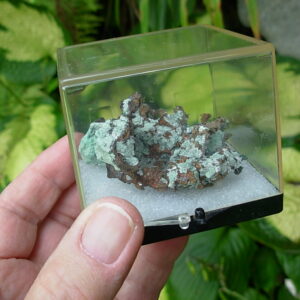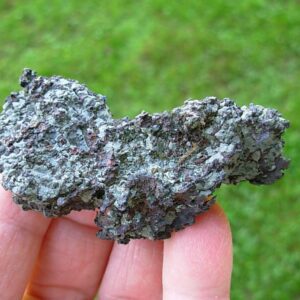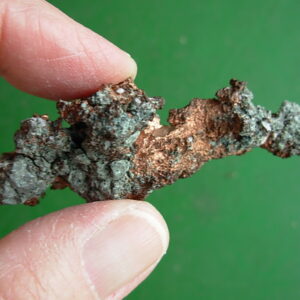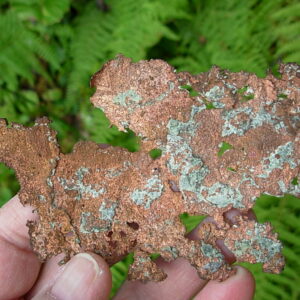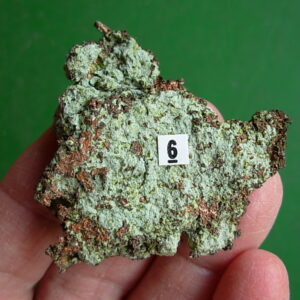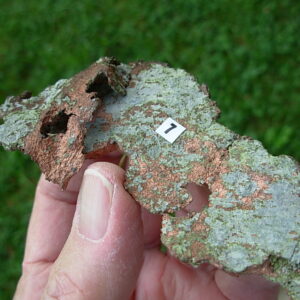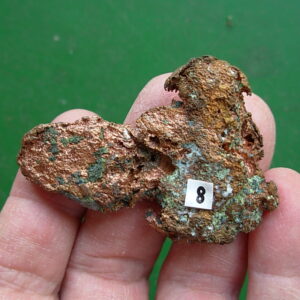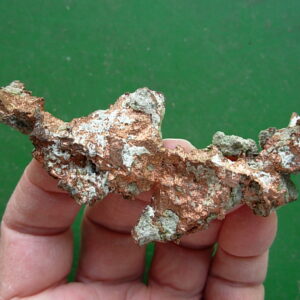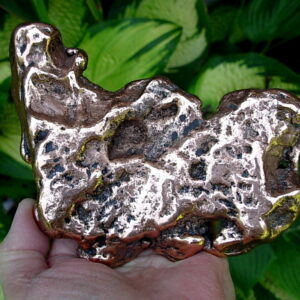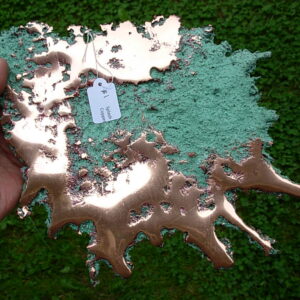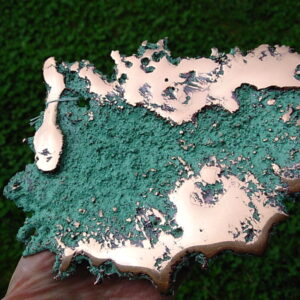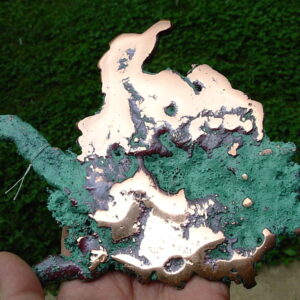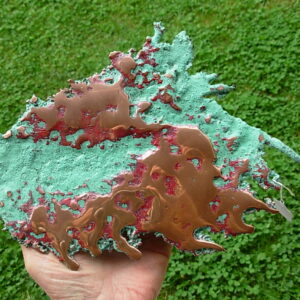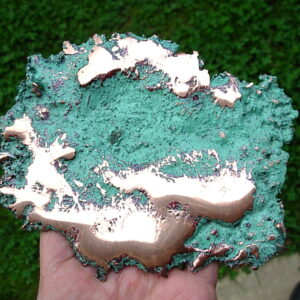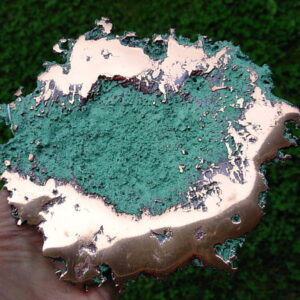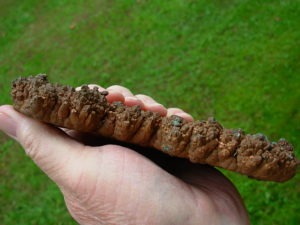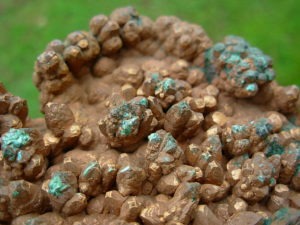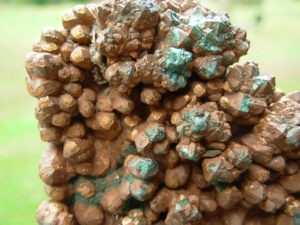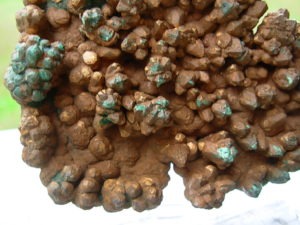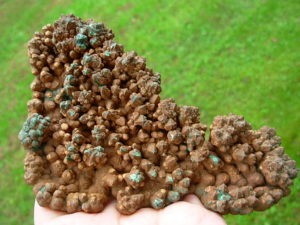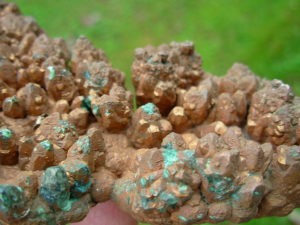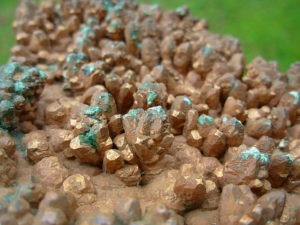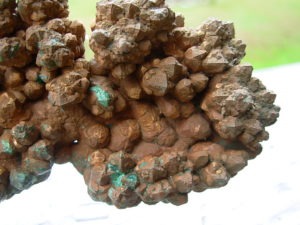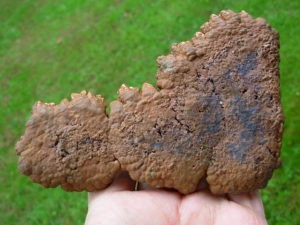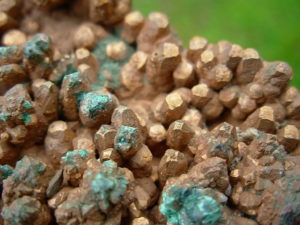Copper
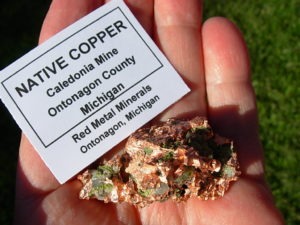
Native copper (copper found in a chemically uncombined state) has been mined for centuries and now is all but depleted as an economically viable ore. Other copper minerals are far more economical to mine and purify into metallic copper that is used for wiring, electrical components, pennies and other coins, tubing and many other applications. Native copper is still found in limited quantities in once-active mining regions. These finds are now valuable as mineralogical specimens and ornamental pieces.
Fine specimens only rarely demonstrate crystal faces and these are prized above similar specimens. The greatest Native Copper Ore Deposits ever found anywhere in the world and mined profitably were those of the Keweenaw Peninsula of Michigan's Upper Peninsula. The Michigan Native Copper mineral deposit occurs in a belt about 110 miles long with a average width of around 10 miles. The Copper mineral occurs in amygadaloids, conglomerates and fissures, and has been found in size from microscopic grains to very large masses (Mass Copper) of up to around 1,200,000 pounds.
Float Copper is found in mass throughout the Midwest and was deposited by the glaciers that moved the Copper masses from the Michigan Copper Country. At the turn of the century, the community of Bisbee, located just east of the Mule Mountains in southeastern Arizona, reigned as one of the premiere copper mining towns in the world. In 1877, Bisbee's Copper Queen Mine opened where miners would extract over eight billion pounds of copper, almost 3 million ounces of gold and over 7.5 million ounces of silver before the close of the mine in 1975.
Native Copper sometimes has Silver Inclusions and is locally called a Half breed. Native Copper has been classified into 14 different Copper forms of occurrence and can occur in 6 Copper crystal habits.
14 Different Forms of Copper
6 Copper crystal habits
-
Float Copper (Butchite) Nugget 8
$74.00 Read more -
Float Copper (Butchite) Nugget 9
$196.00 Read more -
Native Copper Crystals from the Morenci Mine, Arizona 5
$19.00 Add to cart -
Old Stock Native Copper from Keweenaw Peninsula 1
$46.00 Add to cart -
Old Stock Native Copper from Keweenaw Peninsula 2
$24.00 Add to cart -
Old Stock Native Copper from Keweenaw Peninsula 3
$21.60 Add to cart -
Old Stock Native Copper from Keweenaw Peninsula 4
$38.44 Add to cart -
Old Stock Native Copper from Keweenaw Peninsula 6
$28.80 Add to cart -
Old Stock Native Copper from Keweenaw Peninsula 7
$45.00 Add to cart -
Old Stock Native Copper from Keweenaw Peninsula 8
$40.68 Add to cart -
Old Stock Native Copper from Keweenaw Peninsula 9
$48.60 Add to cart -
Polished Drift/Float Copper Nugget 10
$120.00 Read more -
Splash Copper Sculpture 1
$117.60 Read more -
Splash Copper Sculpture 10
$79.27 Read more -
Splash Copper Sculpture 11
$96.00 Read more -
Splash Copper Sculpture 12
$103.20 Read more -
Splash Copper Sculpture 3
$69.40 Read more -
Splash Copper Sculpture 5
$76.49 Read more
Item# 1CUChile10195999
Very Rare Copper Crystal Plate Specimen from the El Salvador Mine, Chile
$250.00

Native Copper from the El Salvador Mine, El Salvador, Atacama Province, Chile
This specimen is from the 1950’s. It was collected by a geologist whose work was home based in Columbia. It is from the El Salvador Mine (The Savior) which is a combined open pit and underground copper mine located in Chile. The mine was originally built by The Anaconda Company in the 1950s. In 1971, with the nationalization of the copper industry in Chile, full ownership of the mine was turned over to the newly formed, state owned copper mining company Codelco (Corporación Nacional del Cobre…which translates to… National Copper Company). The El Salvador Mine operates as Codelco's smallest mine (and also has their highest operating costs). This is a very unique, old and interesting specimen of copper from a very rare locale. Copper specimens from here are uncommon, even in international collections. There are touches of green verdigris on the tops of the arborescent growth with rounded terminations corresponding to deformed crystals.
Specimen weighs 26.6 oz or 1.66 lbs (755g) and Measures 5.9 x 3.8 x 0.9 inches (14.9 x 9.7 x 2.25cm)

